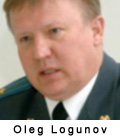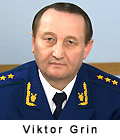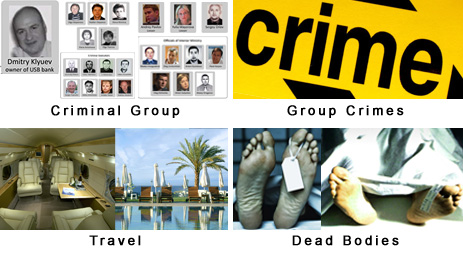he Klyuev Organized Crime Group
has stolen at least $800 million from the Russian people with the aid and protection of the Russian government. The group is responsible for the $230 million theft, uncovered by Sergei Magnitsky, which remains the largest single tax theft in Russian history.
The group members are involved in violent crimes, including kidnapping, extortion and killings. Many of the group’s most important members are Russian officials in law enforcement, FSB, the successor to the KGB, the Tax Ministry, and judges. The group also comprises organised criminals from across the former Soviet Union. The group launders its criminal proceeds through the international banking system, and have systematically used banks and companies in Cyprus, Moldova, Switzerland and the UK. The group has a long history of using its members in law enforcement to blame its crimes on people who are dead or who die under suspicious circumstances.
 The Russian government has chosen to protect the group from charges of theft of state funds, false arrest, torture, and murder. Because the Klyuev Organized Crime Group contains members of the Russian government and because the highest authorities in Russia are protecting it, it is no longer possible to consider the group independent of the Russian state. The Klyuev Organized Crime Group has the full cooperation and protection of high ranking Russian government officials. Its crimes are state sanctioned. Its members are untouchable in Russia.
The Russian government has chosen to protect the group from charges of theft of state funds, false arrest, torture, and murder. Because the Klyuev Organized Crime Group contains members of the Russian government and because the highest authorities in Russia are protecting it, it is no longer possible to consider the group independent of the Russian state. The Klyuev Organized Crime Group has the full cooperation and protection of high ranking Russian government officials. Its crimes are state sanctioned. Its members are untouchable in Russia. The exoneration of the group for the $230 million tax theft has been sanctioned at the highest levels of the Russian government: by Oleg Logunov, Deputy Chief of the Interior Ministry’s Investigative Department, and Viktor Grin, Deputy General Prosecutor of Russia.
 |  |
On May 7, 2012, President Vladimir Putin signed his first executive order on foreign affairs where he officially declared that fighting Magnitsky sanctions is now one of Russia’s top foreign policy goals. In the executive order President Putin said: "Hereby I instruct to carry out active work to prevent the introduction of unilateral extraterritorial sanctions by the USA against Russian legal entities and individuals."

Комментариев нет:
Отправить комментарий